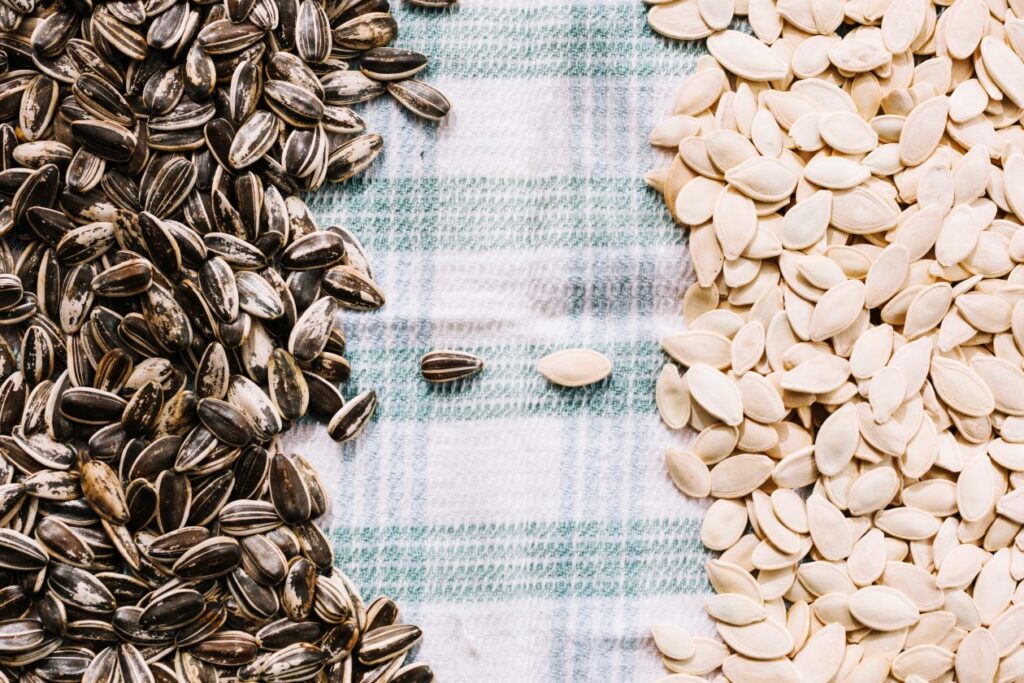Introduction
Famous for their adaptability and nutritional worth, sunflower seeds are the fruit of the Helianthus annuus plant—a convenient snacking alternative complete with vital nutrients, available with shells intact and as hulled kernels. Adding healthy fats, protein, and dietary fiber to their diet, sunflower seeds are a beneficial supplement to many diets and a good source of vitamins and minerals.
How suitable are sunflower seeds for people on the ketogenic diet? This is an essential question for those who follow the high-fat, low-carb approach to induce ketosis. Sunflower seeds are fortunately a good fit for the keto diet thanks to their shallow carbohydrate content. Sunflower seeds can be enjoyed for their nutritional benefits without compromising ketosis, as they have fewer than 4 grams of net carbohydrates per serving, making them keto-friendly. Furthermore, their modest protein content and abundance of beneficial fats support sunflower seeds’ compatibility with the ketogenic lifestyle.
Understanding the Ketogenic Diet
The ketogenic diet, sometimes known as the “keto” diet, is a way of eating that dramatically lowers carbohydrate intake while raising the intake of good fats. This nutritional approach aims to cause the body to enter a metabolic state known as ketosis, in which fat-derived ketones replace glucose as the body’s primary fuel source. Limiting carbohydrates forces the body to burn fat instead of carbohydrates, resulting in several metabolic changes that may benefit health. The ketogenic diet is well known for its ability to help people lose weight, control their blood sugar levels, and improve their cognitive skills.
Achieving and sustaining a state of ketosis, in which the body creates ketones as an alternate fuel source, is the fundamental goal of the ketogenic diet. Although each person’s tolerance may differ, a daily carbohydrate consumption limit of 20 to 50 grams is generally sufficient to induce ketosis. Insulin levels drop when carbs are reduced, which causes the body to release fat stored as energy.
This change in metabolism has been linked to several health advantages, such as decreased body weight, increased insulin sensitivity, and improved cognitive function. Furthermore, there may be therapeutic benefits for the ketogenic diet in the management of specific medical problems, including metabolic disorders, epilepsy, and Alzheimer’s disease. Following a healthcare provider’s instructions is imperative to guarantee safety and adequate nutrition when implementing the ketogenic diet.
Nutritional Profile of Sunflower Seeds

Sunflower seeds have an excellent nutritional profile that fits nicely with the ketogenic diet’s tenets. A 30-gram serving has about 175 calories and boosts energy without adding many calories to your usual intake. Furthermore, with less than 4 grams of net carbohydrates per serving, sunflower seeds are deficient in carbohydrates. Because of their low carbohydrate content, sunflower seeds are an excellent option for anyone following a ketogenic diet because they can be enjoyed as a snack or a part of a meal without worrying about going over their daily carbohydrate intake limit.
Besides their macronutrient makeup, sunflower seeds are abundant in vital minerals and vitamins, providing many health advantages beyond simple calorie restriction. These tiny seeds are incredibly nutrient-dense, containing copper, magnesium, niacin, potassium, phosphorus, selenium, and vitamin E, to name a few. Numerous physiological functions, including immune response, bone health, and energy metabolism, depend critically on these micronutrients. Including sunflower seeds in a ketogenic diet guarantees sufficient micronutrients, promoting general health and energy.
Moreover, sunflower seeds have about 3.3 grams of dietary fiber in every 30-gram meal, making them a great source of fiber. Fiber is necessary for regular bowel motions, satiety support, and digestive health maintenance. Sunflower seeds are an excellent way for people following a ketogenic diet to increase their fiber consumption, which will help reduce constipation and support a healthy gut microbiota. In the context of a ketogenic diet, dietary fiber also helps stabilize blood sugar levels and lowers cholesterol absorption, enhancing the cardiovascular advantages of sunflower seeds.
Dispelling Concerns: Omega-6 Fatty Acids

Sunflower seeds’ high omega-6 fatty acid concentration is one significant worry when including them in a ketogenic diet. Although omega-6 fats are abundant in sunflower seeds, it’s essential to realize that not all omega-6 fats are equal. The polyunsaturated lipid linoleic acid makes up most of the omega-6 fatty acids in sunflower seeds. While getting omega-6 fats from complete food sources, such as sunflower seeds, can have unique advantages when taken in moderation, excessive omega-6 fat consumption—especially from processed vegetable oils—has been related to inflammation and other health problems.
In several physiological functions, such as the construction of cell membranes, immunological response, and inflammation, omega-6 fatty acids are essential. The primary omega-6 fatty acid found in sunflower seeds, linoleic acid, is a precursor to several other critical molecules in the body, including arachidonic acid and specific signaling molecules. Furthermore, linoleic acid is considered an essential fatty acid, meaning the body cannot make it naturally and must receive it through diet. As a result, adding modest amounts of sunflower seeds to a ketogenic diet can help fulfill the body’s need for omega-6 fatty acids and promote general health and well-being.
While maintaining a balanced ratio of omega-6 to omega-3 fats is crucial for decreasing the risk of chronic inflammation and related disorders, omega-6 fatty acids are still necessary for overall health. Omega-6 fats are frequently consumed in Western diets at a higher rate than omega-3 fats, creating an imbalance that may encourage inflammatory processes. To counteract this imbalance, people on a ketogenic diet should increase their consumption of sunflower seeds by adding omega-3 fatty acid sources such as walnuts, flaxseeds, chia seeds, and fatty fish. On a ketogenic journey, people can get a more balanced omega-6 to omega-3 ratio by emphasizing a wide variety of nutritious foods and including omega-3-rich alternatives and sunflower seeds.
Benefits Beyond Ketosis
Beyond being ketocompatible, sunflower seeds have other advantages, especially in promoting cardiovascular health. Sunflower seeds, high in antioxidants like vitamin E and selenium, aid in the fight against oxidative stress and lessen the risk of heart disease. Additionally, when ingested as part of a balanced diet, they include heart-healthy fats, including polyunsaturated and monounsaturated fats, which can help lower LDL cholesterol levels. Sunflower seeds contain vital nutrients and protective chemicals that support cardiovascular function; thus, using them in a ketogenic diet can help improve overall heart health.
Sunflower seeds have a unique nutritional composition that strengthens the immune system in addition to their role in ketosis. Sunflower seeds are rich in vital vitamins and minerals, including zinc, selenium, and vitamin E, which support the body’s defenses against illness and infection. Specifically, vitamin E functions as a potent antioxidant that strengthens the immune system and shields cells from harm. Sunflower seeds are rich in nutrients and can enhance immunity. By including them in a ketogenic diet, people can take advantage of this benefit and become more resilient to illness.
The potassium content of sunflower seeds is another crucial advantage, as it helps maintain normal blood pressure levels. Potassium is essential for maintaining appropriate blood pressure to offset the effects of sodium and regulate fluid balance. Sunflower seeds are high in potassium, so including them in a ketogenic diet can help control blood pressure and lessen the risk of hypertension. People can enjoy the flexibility and advantages of a ketogenic lifestyle while taking proactive measures toward cardiovascular health by prioritizing nutrient-dense foods like sunflower seeds.
Practical Incorporation into Diet
Sunflower seeds provide various snack options for those on a ketogenic diet. Sunflower seeds offer a delightful crunch and nutty flavor that can help stifle appetites and stave off hunger, whether they are eaten raw, roasted, or sprouted. Raw sunflower seeds are an excellent option for individuals looking for the most nutritional benefits because they maintain their natural nutrients and enzymes.
Conversely, roasted sunflower seeds have a crunchy texture and toasted flavor, making them ideal for on-the-go snacking or mixing into salads and trail mixes. Sprouted sunflower seeds are an excellent choice for people with delicate digestive systems or those who want to optimize nutritional uptake because they go through a soaking and germination process that improves their digestibility and nutrient absorption.
Sunflower seeds offer vital nutrients, texture, depth, and flavor to various foods when incorporated into keto-friendly recipes. Sunflower seeds are versatile and may enhance any savory or sweet meal. To add crunch and flavor to delicious recipes, try adding roasted sunflower seeds to stir-fries, salads, and grain-free granolas. Alternatively, blend sunflower seeds with a rich, nutty edge to creamy sauces or dressings.
Sunflower seed butter is a tasty and healthy substitute for regular nut butter in sweet recipes. It’s great for slathering on keto-friendly bread or dipping in apple slices or celery sticks. The flavor profile of foods made with sunflower seeds can be further enhanced by experimenting with other seasonings, such as sea salt, garlic powder, or smoked paprika. This opens up a world of culinary inventiveness.
In addition, sunflower seeds can be substituted for other components in keto baking and cooking, contributing distinct tastes and textures while staying within low-carb limits. In keto-friendly recipes, sunflower seed flour—created by finely powdering raw sunflower seeds—substitutes regular flour with a nutrient-rich alternative. It increases the protein and healthy fat content of baked goods, such as bread, muffins, and pancakes, and gives them a dense texture and somewhat nutty flavor.
Furthermore, roasting sunflower seeds and a small amount of oil can easily blend into a smooth, creamy homemade sunflower seed butter. This nutrient-dense homemade spread is a healthy substitute for store-bought nut butter and can be used for spreading, dipping, or incorporating into other recipes. People can use the benefits of this keto-friendly item in various culinary applications by investigating these alternative uses for sunflower seeds.
Addressing Weight Management
Sunflower seeds are a helpful ally in weight management in ketogenic diets because of their distinct nutritional makeup. Sunflower seeds provide a delightful crunch and are high in dietary fiber and healthy fats that may help reduce overindulgence in calories. They also help to enhance sensations of fullness and satisfaction. Because lipids and fiber slow down digestion, they may assist with appetite control and lead to a reduction in total meal consumption. Thus, preventing hunger sensations and reducing the desire to overindulge in high-carb, high-calorie foods, including sunflower seeds in meals or snacks, can aid in weight management.
Choosing sunflower seeds with the shells on encourages attentive snacking and portion management, which is useful when incorporating them into a ketogenic diet. Picking sunflower seeds still in their shells means that each bite will be consumed more slowly and deliberately, as it takes some work to crack open. Encouraging people to eat sunflower seeds more mindfully and recognize their bodies’ hunger signals and fullness can help them avoid overindulging. Shell-on sunflower seeds are an excellent way to practice portion control and control their calorie intake while having a tasty and nutritious snack that fits well with a ketogenic diet.
According to recent research, Sunflower seeds may provide further advantages for weight loss and metabolic health when included in a ketogenic diet. Research has indicated that eating nuts and seeds, especially sunflower seeds, is linked to a lower body weight and a lower chance of developing metabolic syndrome. The nutritional makeup of sunflower seeds, particularly the high concentration of mono- and polyunsaturated fats, may contribute to weight loss by supporting metabolic health. A well-balanced ketogenic diet that includes sunflower seeds may help people lose weight over the long run by improving their overall body composition and metabolic performance.
Are Sunflower Seeds Keto Friendly?
A. Answer in Short:
Yes, sunflower seeds can be included in a ketogenic diet due to their low carbohydrate and high healthy fat content. While they contain some carbohydrates, the net carb count per serving is relatively low, making them suitable for those following a keto lifestyle. However, portion control is critical, as consuming large quantities of sunflower seeds may still impact ketosis.
B. Answer in Depth:
Sunflower seeds are a popular snack choice for individuals following a ketogenic diet. After accounting for fiber, they contain approximately 6 grams of carbohydrates per ounce, with about 3 grams of net carbs. Additionally, sunflower seeds are rich in healthy fats, including monounsaturated and polyunsaturated fats, which are essential for maintaining ketosis. These fats provide a sustainable energy source for the body, helping individuals on a keto diet feel satiated and energized.
Furthermore, sunflower seeds boast a variety of essential nutrients, such as vitamin E, magnesium, and selenium, which contribute to overall health and well-being. Their micronutrient density makes them a valuable addition to any diet, including ketogenic ones. However, it’s essential to be mindful of portion sizes when incorporating sunflower seeds into a keto meal plan, as excessive consumption can lead to an overabundance of calories and potentially hinder weight loss efforts. Moderation and balance are fundamental principles to follow when enjoying sunflower seeds as part of a ketogenic lifestyle.
FAQ about Sunflower Seeds on Keto
Q: How many sunflower seeds can I eat on keto?
A: You can enjoy sunflower seeds on a keto diet in moderation. While they contain less than 4 grams of net carbs per ¼ cup serving, it’s essential to be mindful of portion sizes. Consuming over 1,500 calories of sunflower seeds may affect ketosis, so practicing portion control and incorporating them as part of a balanced eating plan is advisable.
Q: What seeds are keto-friendly?
A: Besides sunflower seeds, several other seeds are keto-friendly, including chia seeds, flaxseeds, hemp seeds, and sesame seeds. These seeds are low in net carbs and high in healthy fats, making them suitable options for those following a ketogenic diet.
Q: Can I eat sunflower and pumpkin seeds on a keto diet?
A: A keto diet can include sunflower and pumpkin seeds. They are relatively low in net carbs and high in healthy fats, making them compatible with a ketogenic diet when consumed in moderation.
Q: How many sunflower seeds per day is okay?
A: Limiting sunflower seed consumption to about 20-30 grams daily is generally recommended, equating to roughly 100-150 calories. While sunflower seeds offer numerous health benefits, including beneficial fats, overconsumption may lead to excess calorie intake, so enjoying them in moderation is essential.
Conclusion
In conclusion, sunflower seeds might be considered keto-friendly because of their low carbohydrate content. They are well within the macronutrient limits of a ketogenic diet, with a serving size of ¼ cup and fewer than 4 grams of net carbohydrates. But it would help if you ate them in moderation to prevent overindulging, which might interfere with ketosis. You may reap the health advantages of sunflower seeds and stick to your keto diet if you incorporate them with awareness.
Besides being suitable for ketogenic diets, sunflower seeds have other health advantages beyond ketosis. Packed with fiber, protein, vitamins, minerals, and healthy fats, they promote general health and help several body processes. Sunflower seeds are a nutrient-dense food that can support a balanced diet by supporting heart health and assisting with digestion. You can use their nutritional benefits for best health by incorporating them into your diet.
As you embrace a diverse diet, adding sunflower seeds to your meals allows you to experiment with flavors and textures and adds vital nutrients. Sunflower seeds are convenient and versatile snacks that may be added to salads or smoothies or eaten independently. Using sunflower seeds to your advantage will enable you to make well-informed food decisions that balance flavor and nutrition, leading to a healthier way of living.
Reference:
(1)Are Sunflower Seeds Good for You? Nutrition, Benefits, and More
https://www.healthline.com/nutrition/sunflower-seeds
(2)Is It Safe to Eat Sunflower Seed Shells?
https://www.healthline.com/nutrition/can-you-eat-sunflower-seed-shells
Was this helpful?

Joseph Emb, a graduate of The University of Texas, is a dedicated nutritionist who brings academic knowledge and real-world experience to the industry. Beginning his journey with a Bachelor of Science, Joseph focused on essential topics such as biochemistry, food science, and critical thinking.
Passionate about unraveling the intricate relationship between nutrition and health, he explored various areas of nutritional science during his academic pursuits, including food systems management, public health nutrition, and behavioral and clinical nutrition.
As a qualified nutritionist (ANutr), Joseph is deeply committed to evidence-based practice. He ensures that his recommendations are firmly rooted in rigorous scientific research. Beyond academia, he actively engages in research initiatives, continually expanding his expertise and staying abreast of industry advancements.
In addition to his professional endeavors, Joseph is the visionary behind StyleVitally, a renowned platform dedicated to wellness, nutrition, self-care, and health. Through StyleVitally, he empowers individuals to make informed decisions about their health and well-being and offers personalized nutrition advice through online consultations.
Joseph leads a balanced lifestyle, prioritizing physical activity and wholesome dietary choices. He exemplifies the principles he advocates.
Outside of work, he cherishes spending time with his loved ones, understands the importance of family, and enjoys quality moments with his wife and son.
With a steadfast dedication to advancing nutritional research and fostering health and wellness, Joseph Emb leaves an indelible mark on the field of nutrition, enriching the lives of those he encounters.
Follow me on social media for updates and valuable content. I can be found on platforms like Facebook, Twitter, and LinkedIn.










